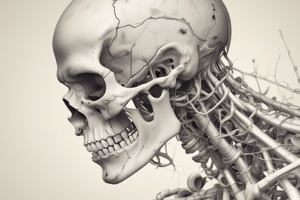Podcast
Questions and Answers
Which bone is considered a vestigial bone and is not articulated with the skeleton?
Which bone is considered a vestigial bone and is not articulated with the skeleton?
- Clavicle (correct)
- Scapula
- Humerus
- Radius
Which muscle arises from the coracoid process of the scapula?
Which muscle arises from the coracoid process of the scapula?
- Supraspinatus muscle
- Coracobrachialis muscle (correct)
- Subscapularis muscle
- Infraspinatus muscle
Which surface of the scapula is the supraspinous fossa located on?
Which surface of the scapula is the supraspinous fossa located on?
- Caudal surface
- Dorsal surface
- Lateral surface (correct)
- Medial surface
Which border of the scapula bears the infraglenoid tubercle?
Which border of the scapula bears the infraglenoid tubercle?
Which tuberosity of the scapula is the largest and serves as the attachment site for the biceps brachii muscle?
Which tuberosity of the scapula is the largest and serves as the attachment site for the biceps brachii muscle?
Flashcards are hidden until you start studying
Study Notes
Anatomical Features of the Scapula
- The hyoid bone is classified as a vestigial bone, as it does not articulate with any other bone in the skeleton.
- The coracobrachialis muscle arises from the coracoid process of the scapula, playing a crucial role in arm movement.
- The supraspinous fossa is located on the posterior surface of the scapula, above the spine, serving as the origin site for the supraspinatus muscle.
- The infraglenoid tubercle is found on the lateral border of the scapula, serving as an attachment point for the long head of the triceps brachii muscle.
- The glenoid cavity is situated on the lateral side of the scapula; however, the largest tuberosity, known as the subscapular fossa, provides the attachment site for the biceps brachii muscle at the coracoid process.
Studying That Suits You
Use AI to generate personalized quizzes and flashcards to suit your learning preferences.



